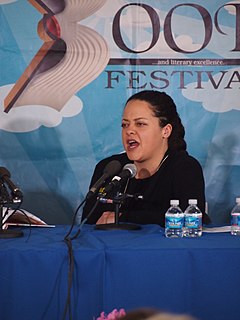Цитата Джамилы Вудс
Мне нравится, как музыка и песнопения использовались в движении за гражданские права, чтобы помочь людям продолжать маршировать. Как песни были и бальзамом, и призывом к действию.
Связанные цитаты
Как слепо верить, что движение за гражданские права когда-либо закончилось. Движение за гражданские права никогда не закончится и никогда не закончится. Он марширует с незапамятных времен. Там, где начал Мартин Лютер Кинг, остановился Ганди, и где он начал, Эйб Линкольн остановился, а до этого Уитфилд вплоть до Моисея. Бог не пошевелился. У нас есть. Но никогда не поздно. Мы не во власти этих событий. Мы можем изменить ход истории. Мы можем противостоять опасной дуге этой истории. Но нам нужны люди, которые готовы говорить правду.
Я пошел на свой первый митинг за гражданские права, когда мне было 17 лет. Я был маленьким тощим блондином, напуганным до смерти, выступавшим против Ку-клукс-клана в Южной Георгии. И с тех пор я никогда не прекращал участвовать в акциях протеста. Никогда не. Я имею в виду, права ЛГБТ, права женщин, права цветных людей... Я твой парень. Я буду там маршировать!
Мы не хотим обвинять жертву. Движение за гражданские права оказало глубокое влияние на Соединенные Штаты и на американское сознание, возможно, уникальное в мире. Как только мы осознали, насколько жертвами стали цветные люди, у нас вырвалось искреннее сочувствие, и именно так мы приняли закон о гражданских правах.
Было интересно иметь возможность комментировать гражданские права. Я имею в виду движение за гражданские права, о котором сегодняшняя молодежь не знает, но Мартин Лютер Кинг считался правящей прессой в первые годы сидячей забастовки опасным человеком, и в то время он был эквивалентом как Малкольм Икс. И ему сказали прекратить свои демонстрации; они были против закона и все такое. Теперь, когда он стал святым и освященным, мы забыли.
Движение за гражданские права не занималось проблемой политического бесправия в северных городах. Он не касался проблем, которые происходили в таких местах, как Детройт, где шел глубокий процесс деиндустриализации. Итак, у вас есть эта реакция разгневанной молодежи на войну во Вьетнаме, недостаточную программу борьбы с бедностью и жестокость полиции. Все это породило движение за власть черных. Движение за власть черных было не отделением от движения за гражданские права, а продолжением всего этого процесса демократизации.
Одна из вещей, которые я знаю о своей семье, своем поколении и своей этике, это то, что мы работаем, и я говорю не только о том, чтобы просто поесть. Вы должны думать о движении за гражданские права, они работали; маршировали, шли мили и мили, приносили жертвы, садились в автобус, кормили друг друга, у них были школы, регистрация избирателей, они работали! Они были трудолюбивыми, поэтому мой совет — работать.
Менее чем за столетие мы пережили великое движение. Молодежное движение! Рабочее движение! Движение за гражданские права! Движение за мир! Движение солидарности! Женское движение! Движение инвалидов! Движение за разоружение! Движение за права геев! Экологическое движение! Движение! Трансформация! Есть ли основания полагать, что мы закончили?
Великие изменения социальной справедливости в нашей стране произошли, когда люди объединились, организовались и предприняли непосредственные действия. Именно это право сегодня поддерживает и питает нашу демократию. Движение за гражданские права, рабочее движение, женское движение и движение за равенство наших братьев и сестер из ЛГБТ — все это проявления этих прав.
Вот уже много лет я открыто поддерживаю гражданские права и права человека для геев и лесбиянок. Геи и лесбиянки отстаивали гражданские права в Монтгомери, Сельме, Олбани, Джорджия и Сент-Огастин, Флорида, и во многих других кампаниях Движения за гражданские права. Многие из этих отважных мужчин и женщин боролись за мою свободу в то время, когда у них было мало голосов, отстаивающих свою собственную, и я приветствую их вклад.
Для черных политиков, организаций по защите гражданских прав и белых либералов поддержка расистской практики Мичиганского университета равносильна грубому предательству принципов гражданских прав нашей исторической борьбы от рабства до окончательной гарантии конституционных прав для всех американцев. Действительно, именно практика, подобная практике Мичиганского университета, но направленная против чернокожих, была в центре внимания большей части движения за гражданские права.



































